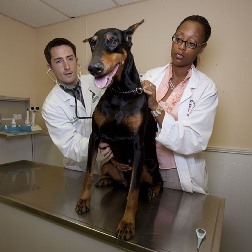How to Choose a Vet Tech School near Baltic Connecticut
 Fulfilling your long term aspiration of working with and caring for pets by enrolling in a vet program near Baltic CT may at first feel like a challenging endeavor. After all, you need to search for and enroll in a school that will deliver the necessary training to ensure that you can succeed as a veterinary assistant, technician or technologist. But just how do you approach reviewing and contrasting programs so that you can make the right choice? Many potential students launch their due diligence process by looking for colleges that are close to their homes. After they have identified some local colleges, they determine which ones have the lowest tuition and hone in on those. Although expense and location are important concerns when comparing vet tech schools, they are by no means the only important ones when making your assessments. Qualifications such as internship programs and accreditation should be considered as well. The main idea is that there are questions you need to be asking the veterinary tech programs you are looking at before you make an ultimate selection. We have presented several within this article to help get you started, but before we discuss them we’ll discuss the different duties of veterinary techs and assistants and the training options offered.
Fulfilling your long term aspiration of working with and caring for pets by enrolling in a vet program near Baltic CT may at first feel like a challenging endeavor. After all, you need to search for and enroll in a school that will deliver the necessary training to ensure that you can succeed as a veterinary assistant, technician or technologist. But just how do you approach reviewing and contrasting programs so that you can make the right choice? Many potential students launch their due diligence process by looking for colleges that are close to their homes. After they have identified some local colleges, they determine which ones have the lowest tuition and hone in on those. Although expense and location are important concerns when comparing vet tech schools, they are by no means the only important ones when making your assessments. Qualifications such as internship programs and accreditation should be considered as well. The main idea is that there are questions you need to be asking the veterinary tech programs you are looking at before you make an ultimate selection. We have presented several within this article to help get you started, but before we discuss them we’ll discuss the different duties of veterinary techs and assistants and the training options offered.
The Job of a Veterinary Assistant and Tech
 Among the initial decisions that you will have to make is whether you desire to train as a vet technician, assistant or technologist. Part of your decision might be dependent on the amount of time and money that you have to invest in your training, but the primary factor will undoubtedly be which specialization appeals to you the most. What vet techs and assistants have in common is that they both work under the immediate supervision of a licensed and practicing veterinarian. And although there are a number of functions that they can perform within the Baltic CT veterinary clinic or hospital, they can’t prescribe medicines, diagnose conditions, or perform surgeries. In those areas they can only furnish assistance to a licensed vet. There are technicians and technologists that work outside of the typical vet practice, for example for zoos, animal shelters or police departments. Let’s take a look at the duties and training requirements for each specialization.
Among the initial decisions that you will have to make is whether you desire to train as a vet technician, assistant or technologist. Part of your decision might be dependent on the amount of time and money that you have to invest in your training, but the primary factor will undoubtedly be which specialization appeals to you the most. What vet techs and assistants have in common is that they both work under the immediate supervision of a licensed and practicing veterinarian. And although there are a number of functions that they can perform within the Baltic CT veterinary clinic or hospital, they can’t prescribe medicines, diagnose conditions, or perform surgeries. In those areas they can only furnish assistance to a licensed vet. There are technicians and technologists that work outside of the typical vet practice, for example for zoos, animal shelters or police departments. Let’s take a look at the duties and training requirements for each specialization.
- Vet Assistants in the majority of instances will have completed a formal training program, either as an intern or apprentice in a vet clinic or hospital, or by finishing a certificate program at a community college or trade school near Baltic CT. As the name implies, their job function is to assist the veterinarians and vet technicians in the completion of their duties. Normally they are not associated with more complicated undertakings, for example assisting with surgical procedures. A few of their usual responsibilities may include working at the front desk, cleaning and preparing exam rooms and equipment, or controlling animals during exams.
- Vet Technicians receive more extensive training in contrast to assistants and generally obtain a 2 year Associate Degree, preferably from an American Veterinary Medical Association (AVMA) accredited program. They are in a sense the veterinarian equivalent of medical nurses, since their basic job function is to assist veterinarians with diagnosing and treating animal patients. Where they differ from veterinary assistants is that they are engaged in more complicated tasks, for example assisting with surgical procedures or administering medication. All states presently require vet technicians pass a credentialing exam for either licensing, registration or certification.
- Vet Technologists are comparable to veterinary techs and basically carry out the same work functions. They are required to obtain a Bachelor’s Degree in veterinary technology, which usually requires four years. Therefore the main distinction between a vet technologist and a technician is the technologist’s more advanced level of education. But with an advanced degree comes more job options, increased salaries and potential management positions. They are additionally mandated to pass a credentialing exam for either registration, certification or licensing.
Veterinary techs and technologists may specialize in areas such as internal medicine, anesthesia or urgent care. Many may earn certification from the American Association for Laboratory Animal Science (AALAS) to work in labs or Baltic CT area research facilities also.
Vet Online Programs
 An approach that may be a solution for those with a hectic schedule or who are working full-time while going to vet college is to enroll in an online training program. Because the classes are provided via the internet, students can study on their own timetable wherever a computer is available. The syllabus is taught using multiple venues, including slide shows, videos and live streaming webinars. And since most veterinary technician and technologist degrees require practical training, that segment can usually be fulfilled as an internship or work study program at an area Baltic CT veterinarian clinic or hospital. Distance learning, as it is also called, may in many instances reduce the cost of your education. Tuition and secondary costs, such as for travel and study materials, may be more affordable compared to more traditional classroom courses. Just make sure that the program that you select is accredited, either by the AVMA or another nationally certified accrediting agency. With the online classes and the practical training, everything is provided for a comprehensive education. So if you are disciplined enough to learn in this more independent mode, an online veterinary technician or assistant school may be the right choice for you.
An approach that may be a solution for those with a hectic schedule or who are working full-time while going to vet college is to enroll in an online training program. Because the classes are provided via the internet, students can study on their own timetable wherever a computer is available. The syllabus is taught using multiple venues, including slide shows, videos and live streaming webinars. And since most veterinary technician and technologist degrees require practical training, that segment can usually be fulfilled as an internship or work study program at an area Baltic CT veterinarian clinic or hospital. Distance learning, as it is also called, may in many instances reduce the cost of your education. Tuition and secondary costs, such as for travel and study materials, may be more affordable compared to more traditional classroom courses. Just make sure that the program that you select is accredited, either by the AVMA or another nationally certified accrediting agency. With the online classes and the practical training, everything is provided for a comprehensive education. So if you are disciplined enough to learn in this more independent mode, an online veterinary technician or assistant school may be the right choice for you.
Things to Ask Vet Assistant and Technician Programs
 At this point you should have determined which veterinarian certificate or degree that you would like to earn, and if you prefer to study online or attend a school on campus. Since there are a large number of veterinarian community colleges, vocational and technical schools in Connecticut and across the United States, you need to ask some qualifying questions in order to narrow down your list of alternatives. As we pointed out in our introduction, many future students start by focusing on location and tuition expense. But we have already pointed out other essential qualifiers, for instance internship programs and accreditation. And obviously you need to select a college that offers the specialty and degree that you want to earn. These and other factors are reviewed in the checklist of questions that you should ask the Baltic CT vet assistant and technician schools that you are considering.
At this point you should have determined which veterinarian certificate or degree that you would like to earn, and if you prefer to study online or attend a school on campus. Since there are a large number of veterinarian community colleges, vocational and technical schools in Connecticut and across the United States, you need to ask some qualifying questions in order to narrow down your list of alternatives. As we pointed out in our introduction, many future students start by focusing on location and tuition expense. But we have already pointed out other essential qualifiers, for instance internship programs and accreditation. And obviously you need to select a college that offers the specialty and degree that you want to earn. These and other factors are reviewed in the checklist of questions that you should ask the Baltic CT vet assistant and technician schools that you are considering.
Is the Veterinary College Accredited? It’s imperative that you make sure that the veterinary assistant or tech college you choose is accredited by a regional or national accrediting agency. As previously mentioned, among the most highly respected is the American Veterinary Medical Association (AVMA). Trade schools and colleges that are accredited by the AVMA have undergone a demanding screening process that verifies you will obtain a quality education. Also, accreditation is important if you are applying for a student loan or financial aid, since a large number of programs are not available for non-accredited schools. And finally, having a certificate or degree from an accredited program is frequently a prerequisite for employment for many Baltic CT veterinarian practices and hospitals.
What is the Program’s Reputation? The veterinary college or vocational school and program you select must have an outstanding reputation within the veterinary community. You can begin your due diligence by asking the colleges you are reviewing for endorsements from the employers in their job placement network. Other pointers include checking with online school ranking websites and speaking with the school’s accrediting organizations as well. You can ask the Connecticut school licensing authority if there have been any complaints or infractions concerning your specific schools. As a final tip, contact some Baltic CT vet clinics that you may wish to work for after you receive your training. Ask what they think of your school selections. They might even recommend some programs not on your list.
Are there Internship Programs? The most effective way to obtain clinical hands on training as a vet assistant or technician is to work in a medical setting. Ask if the colleges you are reviewing have internship programs established with local veterinarians, vet clinics or hospitals. Almost all veterinary medicine programs mandate practical training and many provide it by way of internships. Not only will the experience be invaluable as far as the clinical training, but an internship may also help build relationships in the local Baltic CT veterinary community and aid in the search for employment after graduation.
Is there a Job Placement Program? Searching for a job after graduating from a veterinary technician or assistant college can be difficult without the help of a job placement program. To begin with, ask what the graduation rates are for the colleges you are considering. A low rate might signify that the teachers were ineffective at teaching the curriculum or that some students were disappointed with the program and quit. Next, verify that the schools have a job placement program and find out what their placement rates are. A higher placement rate could signify that the Baltic CT program has an outstanding reputation within the veterinarian community and has a considerable network of contacts for student placements. A low rate could signify that the training is not highly regarded by employers or that the job placement program is a failure at placing students.
How Large are the Classes? If the classes are larger in size, you most likely will get little or no one-on-one instruction from the teachers. Request from the Baltic CT programs you are considering what their classroom student to teacher ratios are. You might also decide to attend a few classes (if practical) to monitor the interaction between students and instructors. Ask for feedback from students concerning the quality of instruction. Also, speak with the teachers and determine what their qualifications are as well as their approaches to teaching.
Where is the College Located? Yes, we previously discussed location, but there are several more points to make on the topic. If you are planning to drive to your vet technician classes from work or home, you must confirm that the commuting time is compatible with your schedule. For example, driving during the weekend to check out the route won’t be the same as the commute during rush hour traffic, particularly if the Baltic CT school is located close by or within a large city. In addition, if you do opt to attend a school in another state or even outside of your County of residence, there may be higher tuition fees especially for state and community colleges. On the other hand, taking online classes might be an alternative that will give you more flexibility and minimize the need for travel.
Is the Class Schedule Flexible? And finally, it’s imperative that you determine if the Connecticut veterinarian colleges you are evaluating offer class times that are sufficiently flexible to accommodate your schedule. For example, many students continue to work full time and can only attend classes on the weekends or at night. Others may only be able to go to class in the morning or later in the afternoon. Verify that the class times you require are offered near Baltic CT prior to enrolling. In addition, find out if you can make up classes that you may miss because of sickness, work or family issues. You might discover that an online college is the ideal solution to fit your veterinary training into your hectic life.
Why Did You Choose to Become a Vet Assistant?
When preparing to interview for a veterinary job, it's important to consider questions you may be asked. Among the things that recruiters typically ask veterinary prospects is "What made you choose veterinary care as a career?". What the interviewer is hoping to learn is not only the private reasons you might have for being a veterinary technician, but also what characteristics and abilities you have that make you outstanding at your profession. You will undoubtedly be asked questions relating specifically to veterinary care, as well as a significant number of standard interview questions, so you must ready some ideas about how you want to address them. Considering there are several factors that go into selecting a career, you can respond to this primary question in a variety of ways. When formulating an answer, aim to include the reasons the profession appeals to you along with the talents you have that make you an outstanding vet tech and the perfiect choice for the position. Don't make an effort to memorize a response, but jot down some ideas and talking points that pertain to your personal strengths and experiences. Reading through sample answers can help you to formulate your own concepts, and provide ideas of what to discuss to enthuse the recruiter.Pick the Best Veterinary Tech Degree Program near Baltic CT
Picking the appropriate veterinary technician college is an important first step to beginning a rewarding career delivering care and treatment for animals. Potential students thinking about veterinary tech or assistant schools need to make their determination based on multiple key issues. Veterinary techs, assistants and technologists are employed in animal hospitals, veterinary clinics and animal shelters. They usually handle administrative tasks and assist the veterinarian with the animals when needed. As we have covered, it’s very important that you decide on a veterinary medicine program that is both accredited and has an outstanding reputation within the field. This applies to online vet tech programs as well. By asking the questions included in our checklist for assessing schools, you will be able to reduce your alternatives so that you can make your final selection. And by choosing the ideal school, you can accomplish your goal of becoming a veterinary assistant, tech or technologist in Baltic CT.
A Little Bit About Baltic CT
Baltic amber
The Baltic region is home to the largest known deposit of amber, called Baltic amber or succinite. It dates from 44 million years ago (during the Eocene epoch).[1] It has been estimated that these forests created more than 100,000 tons of amber.[2] Today, more than 90% of the world's amber comes from Kaliningrad Oblast of Russia. It is a major source of income for the region; the local Kaliningrad Amber Combine extracted 250 tonnes of it in 2014,[3] 400 tonnes in 2015.[4]
"Baltic amber" was formerly thought to include amber from the Bitterfeld brown coal mines in Saxony (Eastern Germany). Bitterfeld amber was previously believed to be only 20–22 million years old (Miocene), but a comparison of the animal inclusions in 2003 suggested that it was possibly Baltic amber that was redeposited in a Miocene deposit.[5] Further study of insect taxa in the ambers has shown Bitterfeld amber to be from the same forest as the Baltic amber forest, but separately deposited from a more southerly section, in a similar manner as Rovno amber.[6] Other sources of Baltic amber have been listed as coming from Poland and Russia.
Because Baltic amber contains about 8% succinic acid, it is also termed succinite.
More Cities of Interest in Connecticut
